Hospitality Business: Financial Management and HR Life Cycle
VerifiedAdded on 2023/06/08
|20
|4020
|475
Report
AI Summary
This report analyzes the financial and human resource aspects of a hospitality business, specifically focusing on East London Catering. It covers financial transactions, double-entry bookkeeping, trial balance preparation, cost management, and the importance of accurate financial recording. The report also examines the HR life cycle stages, including talent acquisition, recruitment, onboarding, and development, with a focus on the role of HR in retaining talent. Additionally, it addresses relevant legislation, employment law, and ethical considerations impacting business decision-making within the hospitality sector. The analysis provides recommendations for improving financial management and HR practices to achieve business growth. Desklib provides comprehensive study tools and solved assignments for students.
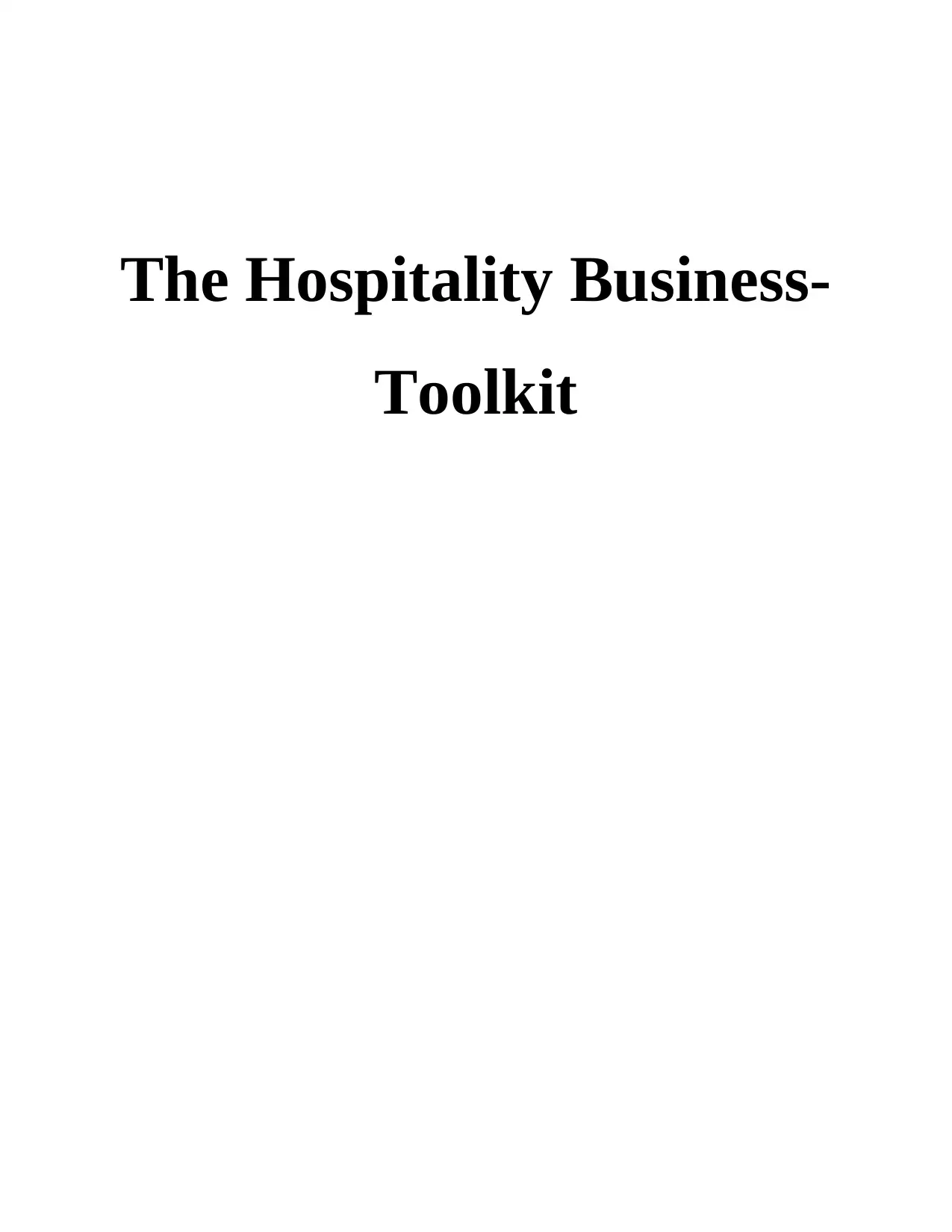
The Hospitality Business-
Toolkit
Toolkit
Paraphrase This Document
Need a fresh take? Get an instant paraphrase of this document with our AI Paraphraser

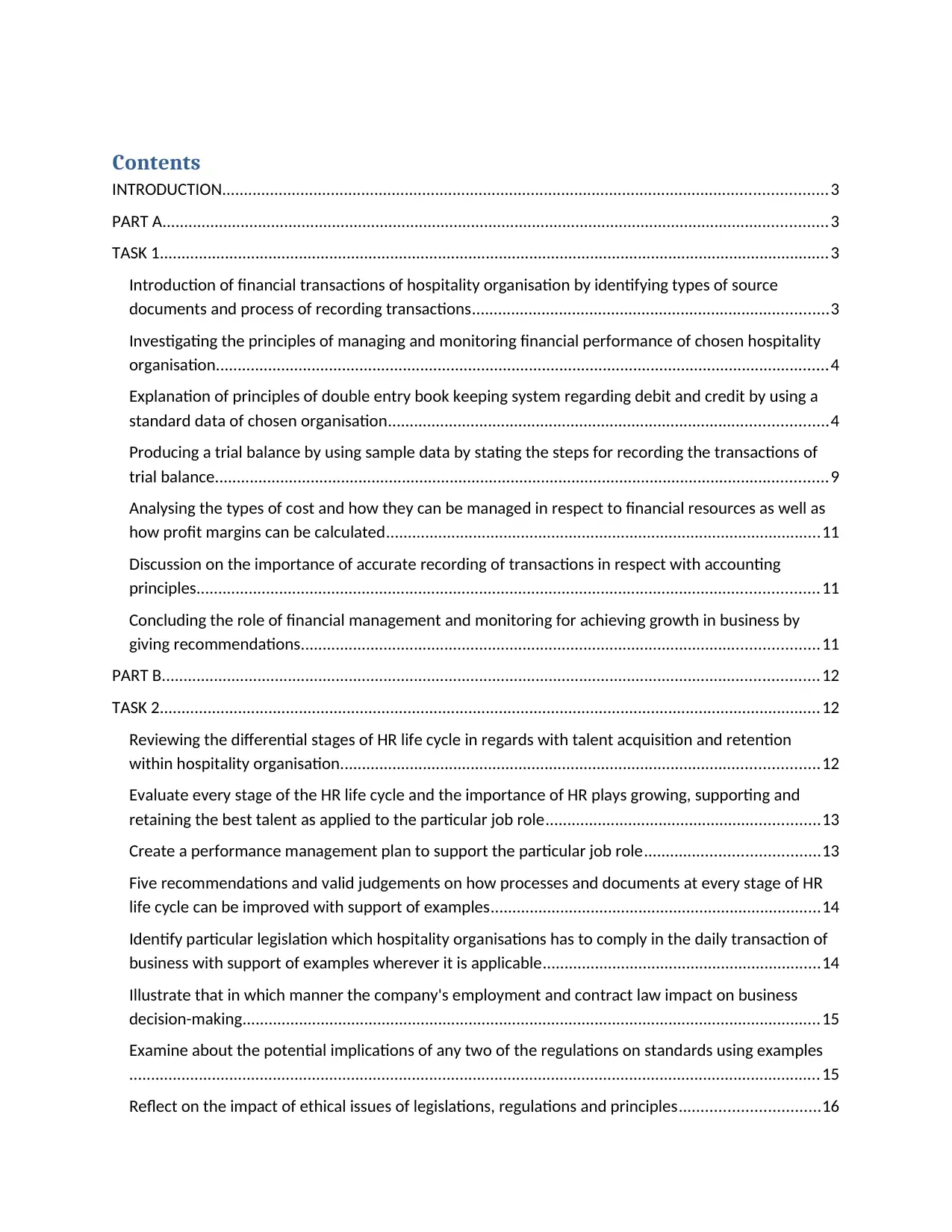
Contents
INTRODUCTION...........................................................................................................................................3
PART A.........................................................................................................................................................3
TASK 1..........................................................................................................................................................3
Introduction of financial transactions of hospitality organisation by identifying types of source
documents and process of recording transactions..................................................................................3
Investigating the principles of managing and monitoring financial performance of chosen hospitality
organisation.............................................................................................................................................4
Explanation of principles of double entry book keeping system regarding debit and credit by using a
standard data of chosen organisation.....................................................................................................4
Producing a trial balance by using sample data by stating the steps for recording the transactions of
trial balance.............................................................................................................................................9
Analysing the types of cost and how they can be managed in respect to financial resources as well as
how profit margins can be calculated....................................................................................................11
Discussion on the importance of accurate recording of transactions in respect with accounting
principles...............................................................................................................................................11
Concluding the role of financial management and monitoring for achieving growth in business by
giving recommendations.......................................................................................................................11
PART B.......................................................................................................................................................12
TASK 2........................................................................................................................................................12
Reviewing the differential stages of HR life cycle in regards with talent acquisition and retention
within hospitality organisation..............................................................................................................12
Evaluate every stage of the HR life cycle and the importance of HR plays growing, supporting and
retaining the best talent as applied to the particular job role...............................................................13
Create a performance management plan to support the particular job role........................................13
Five recommendations and valid judgements on how processes and documents at every stage of HR
life cycle can be improved with support of examples............................................................................14
Identify particular legislation which hospitality organisations has to comply in the daily transaction of
business with support of examples wherever it is applicable................................................................14
Illustrate that in which manner the company's employment and contract law impact on business
decision-making.....................................................................................................................................15
Examine about the potential implications of any two of the regulations on standards using examples
...............................................................................................................................................................15
Reflect on the impact of ethical issues of legislations, regulations and principles................................16
INTRODUCTION...........................................................................................................................................3
PART A.........................................................................................................................................................3
TASK 1..........................................................................................................................................................3
Introduction of financial transactions of hospitality organisation by identifying types of source
documents and process of recording transactions..................................................................................3
Investigating the principles of managing and monitoring financial performance of chosen hospitality
organisation.............................................................................................................................................4
Explanation of principles of double entry book keeping system regarding debit and credit by using a
standard data of chosen organisation.....................................................................................................4
Producing a trial balance by using sample data by stating the steps for recording the transactions of
trial balance.............................................................................................................................................9
Analysing the types of cost and how they can be managed in respect to financial resources as well as
how profit margins can be calculated....................................................................................................11
Discussion on the importance of accurate recording of transactions in respect with accounting
principles...............................................................................................................................................11
Concluding the role of financial management and monitoring for achieving growth in business by
giving recommendations.......................................................................................................................11
PART B.......................................................................................................................................................12
TASK 2........................................................................................................................................................12
Reviewing the differential stages of HR life cycle in regards with talent acquisition and retention
within hospitality organisation..............................................................................................................12
Evaluate every stage of the HR life cycle and the importance of HR plays growing, supporting and
retaining the best talent as applied to the particular job role...............................................................13
Create a performance management plan to support the particular job role........................................13
Five recommendations and valid judgements on how processes and documents at every stage of HR
life cycle can be improved with support of examples............................................................................14
Identify particular legislation which hospitality organisations has to comply in the daily transaction of
business with support of examples wherever it is applicable................................................................14
Illustrate that in which manner the company's employment and contract law impact on business
decision-making.....................................................................................................................................15
Examine about the potential implications of any two of the regulations on standards using examples
...............................................................................................................................................................15
Reflect on the impact of ethical issues of legislations, regulations and principles................................16
⊘ This is a preview!⊘
Do you want full access?
Subscribe today to unlock all pages.

Trusted by 1+ million students worldwide

CONCLUSION.............................................................................................................................................16
REFERENCES..............................................................................................................................................17
REFERENCES..............................................................................................................................................17
Paraphrase This Document
Need a fresh take? Get an instant paraphrase of this document with our AI Paraphraser
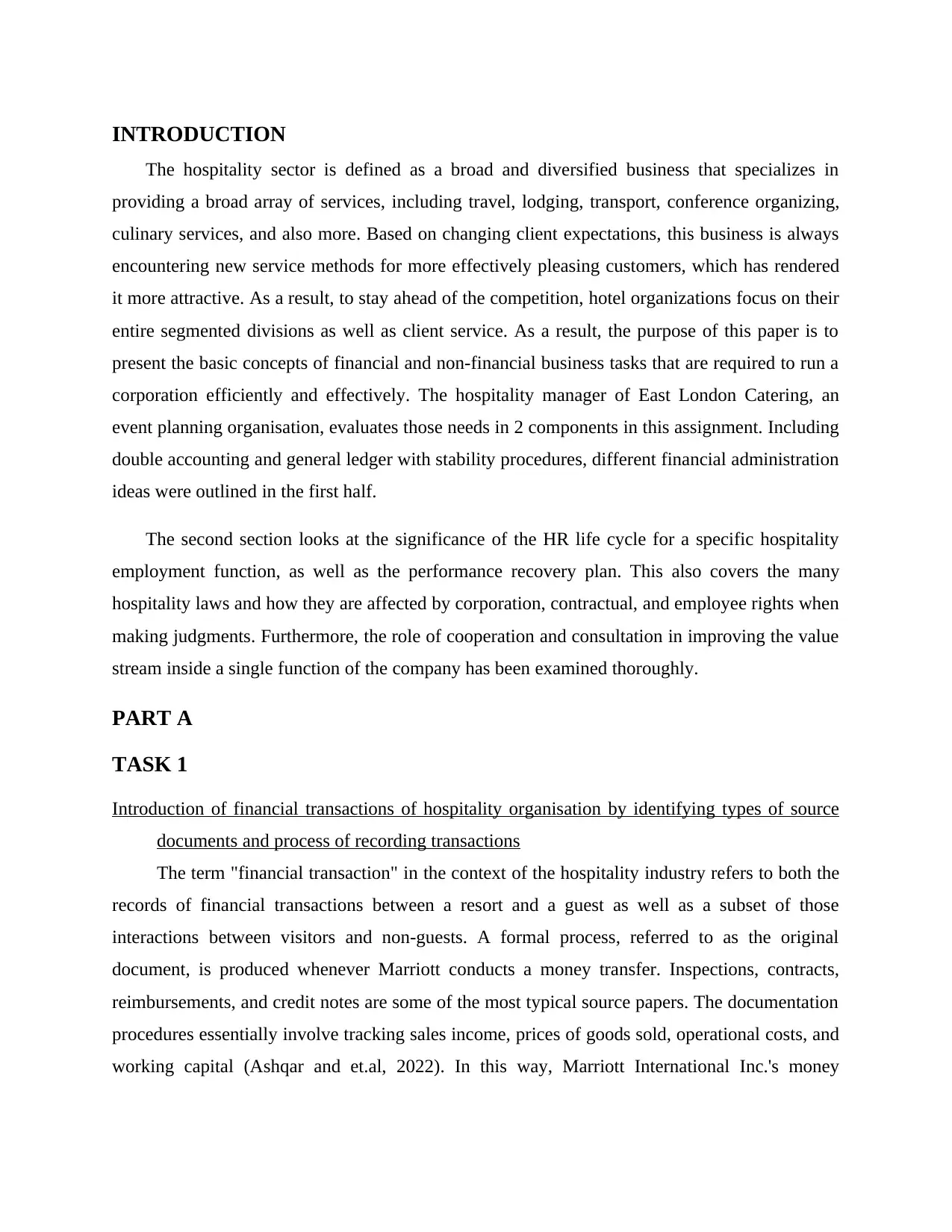
INTRODUCTION
The hospitality sector is defined as a broad and diversified business that specializes in
providing a broad array of services, including travel, lodging, transport, conference organizing,
culinary services, and also more. Based on changing client expectations, this business is always
encountering new service methods for more effectively pleasing customers, which has rendered
it more attractive. As a result, to stay ahead of the competition, hotel organizations focus on their
entire segmented divisions as well as client service. As a result, the purpose of this paper is to
present the basic concepts of financial and non-financial business tasks that are required to run a
corporation efficiently and effectively. The hospitality manager of East London Catering, an
event planning organisation, evaluates those needs in 2 components in this assignment. Including
double accounting and general ledger with stability procedures, different financial administration
ideas were outlined in the first half.
The second section looks at the significance of the HR life cycle for a specific hospitality
employment function, as well as the performance recovery plan. This also covers the many
hospitality laws and how they are affected by corporation, contractual, and employee rights when
making judgments. Furthermore, the role of cooperation and consultation in improving the value
stream inside a single function of the company has been examined thoroughly.
PART A
TASK 1
Introduction of financial transactions of hospitality organisation by identifying types of source
documents and process of recording transactions
The term "financial transaction" in the context of the hospitality industry refers to both the
records of financial transactions between a resort and a guest as well as a subset of those
interactions between visitors and non-guests. A formal process, referred to as the original
document, is produced whenever Marriott conducts a money transfer. Inspections, contracts,
reimbursements, and credit notes are some of the most typical source papers. The documentation
procedures essentially involve tracking sales income, prices of goods sold, operational costs, and
working capital (Ashqar and et.al, 2022). In this way, Marriott International Inc.'s money
The hospitality sector is defined as a broad and diversified business that specializes in
providing a broad array of services, including travel, lodging, transport, conference organizing,
culinary services, and also more. Based on changing client expectations, this business is always
encountering new service methods for more effectively pleasing customers, which has rendered
it more attractive. As a result, to stay ahead of the competition, hotel organizations focus on their
entire segmented divisions as well as client service. As a result, the purpose of this paper is to
present the basic concepts of financial and non-financial business tasks that are required to run a
corporation efficiently and effectively. The hospitality manager of East London Catering, an
event planning organisation, evaluates those needs in 2 components in this assignment. Including
double accounting and general ledger with stability procedures, different financial administration
ideas were outlined in the first half.
The second section looks at the significance of the HR life cycle for a specific hospitality
employment function, as well as the performance recovery plan. This also covers the many
hospitality laws and how they are affected by corporation, contractual, and employee rights when
making judgments. Furthermore, the role of cooperation and consultation in improving the value
stream inside a single function of the company has been examined thoroughly.
PART A
TASK 1
Introduction of financial transactions of hospitality organisation by identifying types of source
documents and process of recording transactions
The term "financial transaction" in the context of the hospitality industry refers to both the
records of financial transactions between a resort and a guest as well as a subset of those
interactions between visitors and non-guests. A formal process, referred to as the original
document, is produced whenever Marriott conducts a money transfer. Inspections, contracts,
reimbursements, and credit notes are some of the most typical source papers. The documentation
procedures essentially involve tracking sales income, prices of goods sold, operational costs, and
working capital (Ashqar and et.al, 2022). In this way, Marriott International Inc.'s money

transfers have been completed while also recognizing the underlying papers and recording
procedures.
Investigating the principles of managing and monitoring financial performance of chosen
hospitality organisation
The process of analyzing a firm's productivity, analysis of the financial sufficiency and
revenue that providing diversified daily operations is classified as financial efficiency. There are
several concepts that may be used to measure and control financial results in order to improve
the financial situation when implementing company plans. The following are the primary
principles behind East London Catering's successful business results:
Consideration of budget before taking action: As a hotel manager, they'll need the necessary
financial resources and costs to engage efficiently in order to complete the responsibilities
involved in producing a successful proposed budget. The budgeting must be based primarily on
the company's present financial situation, and that it must be monitored to discover and correct
bank transaction mistakes in order to reduce operational expenses.
Proper and detail record of financial transaction: Although financial info is interconnected,
everyday business activities must be ensuring a successful together with relevant papers and
structured in a certain order. The data must be thoroughly enrolled for analyzing financial effects
because the ultimate findings of such recordings aid in future judgments.
Explanation of principles of double entry book keeping system regarding debit and credit by
using a standard data of chosen organisation
The double-entry bookkeeping system is a business principle whereby each corporate
activity should be recorded in two distinct and equivalent entries, referred to as receivable and
payable, respectively (Antonelli et al, 2020). To do so, proper data must be input so that
repayments could be made and money earned from resources may be produced on schedule. East
London Catering's double-entry book-keeping method for recording buy and selling transactions
is supplied through into the general journal for use in the accounting records for the month of
March 2020, as the housing and finance management. The debit and credits of every account are
provided in the journal entry, which is a historical accounting record.
procedures.
Investigating the principles of managing and monitoring financial performance of chosen
hospitality organisation
The process of analyzing a firm's productivity, analysis of the financial sufficiency and
revenue that providing diversified daily operations is classified as financial efficiency. There are
several concepts that may be used to measure and control financial results in order to improve
the financial situation when implementing company plans. The following are the primary
principles behind East London Catering's successful business results:
Consideration of budget before taking action: As a hotel manager, they'll need the necessary
financial resources and costs to engage efficiently in order to complete the responsibilities
involved in producing a successful proposed budget. The budgeting must be based primarily on
the company's present financial situation, and that it must be monitored to discover and correct
bank transaction mistakes in order to reduce operational expenses.
Proper and detail record of financial transaction: Although financial info is interconnected,
everyday business activities must be ensuring a successful together with relevant papers and
structured in a certain order. The data must be thoroughly enrolled for analyzing financial effects
because the ultimate findings of such recordings aid in future judgments.
Explanation of principles of double entry book keeping system regarding debit and credit by
using a standard data of chosen organisation
The double-entry bookkeeping system is a business principle whereby each corporate
activity should be recorded in two distinct and equivalent entries, referred to as receivable and
payable, respectively (Antonelli et al, 2020). To do so, proper data must be input so that
repayments could be made and money earned from resources may be produced on schedule. East
London Catering's double-entry book-keeping method for recording buy and selling transactions
is supplied through into the general journal for use in the accounting records for the month of
March 2020, as the housing and finance management. The debit and credits of every account are
provided in the journal entry, which is a historical accounting record.
⊘ This is a preview!⊘
Do you want full access?
Subscribe today to unlock all pages.

Trusted by 1+ million students worldwide
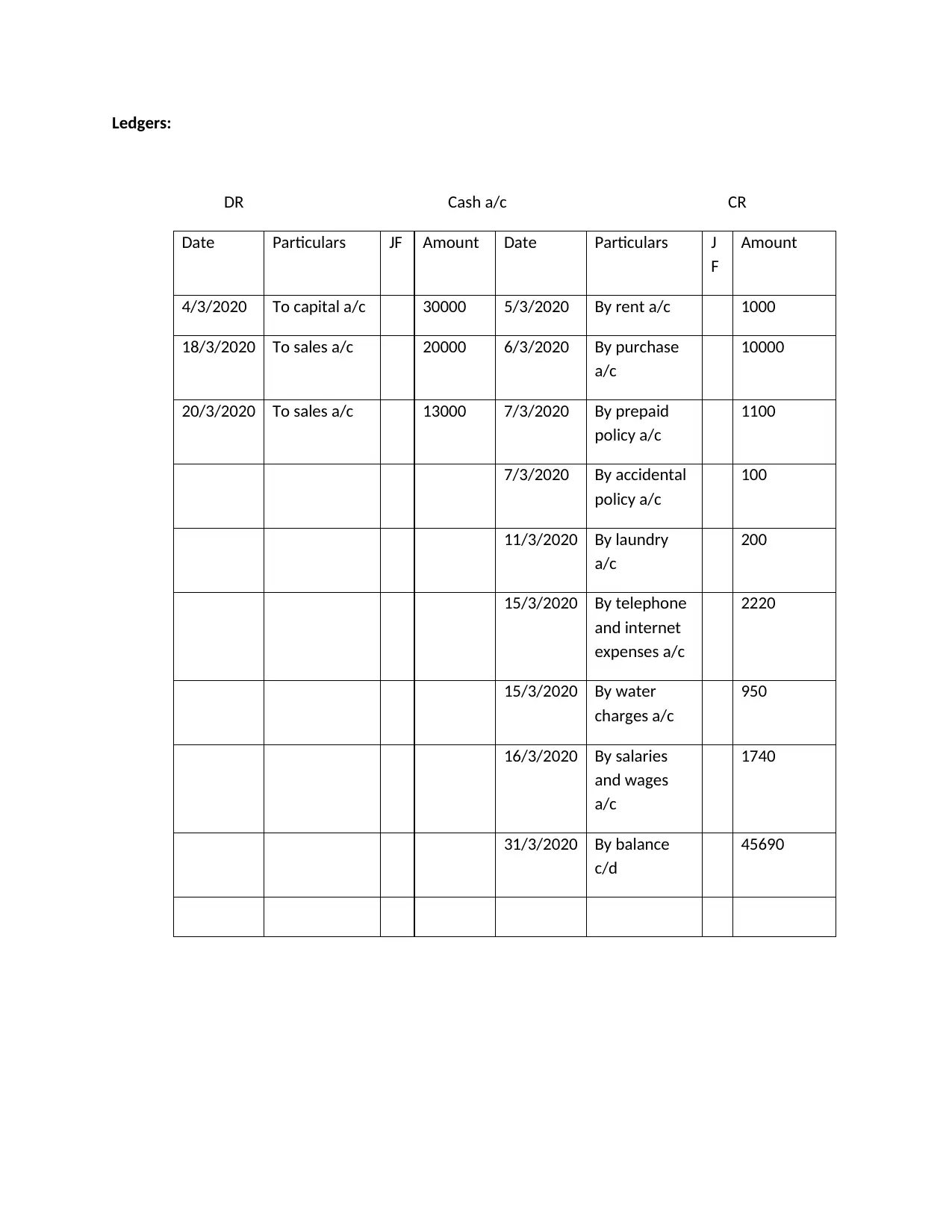
Ledgers:
DR Cash a/c CR
Date Particulars JF Amount Date Particulars J
F
Amount
4/3/2020 To capital a/c 30000 5/3/2020 By rent a/c 1000
18/3/2020 To sales a/c 20000 6/3/2020 By purchase
a/c
10000
20/3/2020 To sales a/c 13000 7/3/2020 By prepaid
policy a/c
1100
7/3/2020 By accidental
policy a/c
100
11/3/2020 By laundry
a/c
200
15/3/2020 By telephone
and internet
expenses a/c
2220
15/3/2020 By water
charges a/c
950
16/3/2020 By salaries
and wages
a/c
1740
31/3/2020 By balance
c/d
45690
DR Cash a/c CR
Date Particulars JF Amount Date Particulars J
F
Amount
4/3/2020 To capital a/c 30000 5/3/2020 By rent a/c 1000
18/3/2020 To sales a/c 20000 6/3/2020 By purchase
a/c
10000
20/3/2020 To sales a/c 13000 7/3/2020 By prepaid
policy a/c
1100
7/3/2020 By accidental
policy a/c
100
11/3/2020 By laundry
a/c
200
15/3/2020 By telephone
and internet
expenses a/c
2220
15/3/2020 By water
charges a/c
950
16/3/2020 By salaries
and wages
a/c
1740
31/3/2020 By balance
c/d
45690
Paraphrase This Document
Need a fresh take? Get an instant paraphrase of this document with our AI Paraphraser
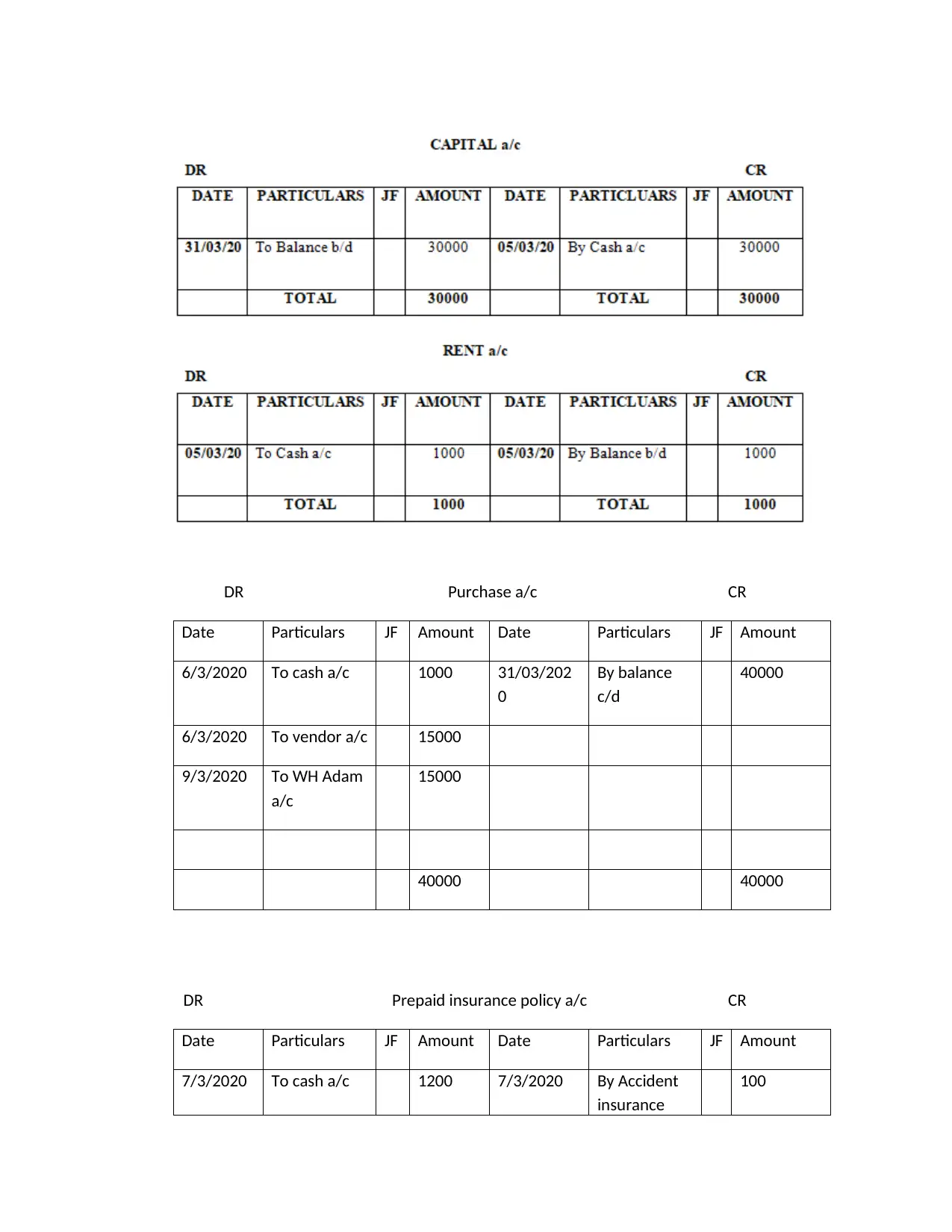
DR Purchase a/c CR
Date Particulars JF Amount Date Particulars JF Amount
6/3/2020 To cash a/c 1000 31/03/202
0
By balance
c/d
40000
6/3/2020 To vendor a/c 15000
9/3/2020 To WH Adam
a/c
15000
40000 40000
DR Prepaid insurance policy a/c CR
Date Particulars JF Amount Date Particulars JF Amount
7/3/2020 To cash a/c 1200 7/3/2020 By Accident
insurance
100
Date Particulars JF Amount Date Particulars JF Amount
6/3/2020 To cash a/c 1000 31/03/202
0
By balance
c/d
40000
6/3/2020 To vendor a/c 15000
9/3/2020 To WH Adam
a/c
15000
40000 40000
DR Prepaid insurance policy a/c CR
Date Particulars JF Amount Date Particulars JF Amount
7/3/2020 To cash a/c 1200 7/3/2020 By Accident
insurance
100
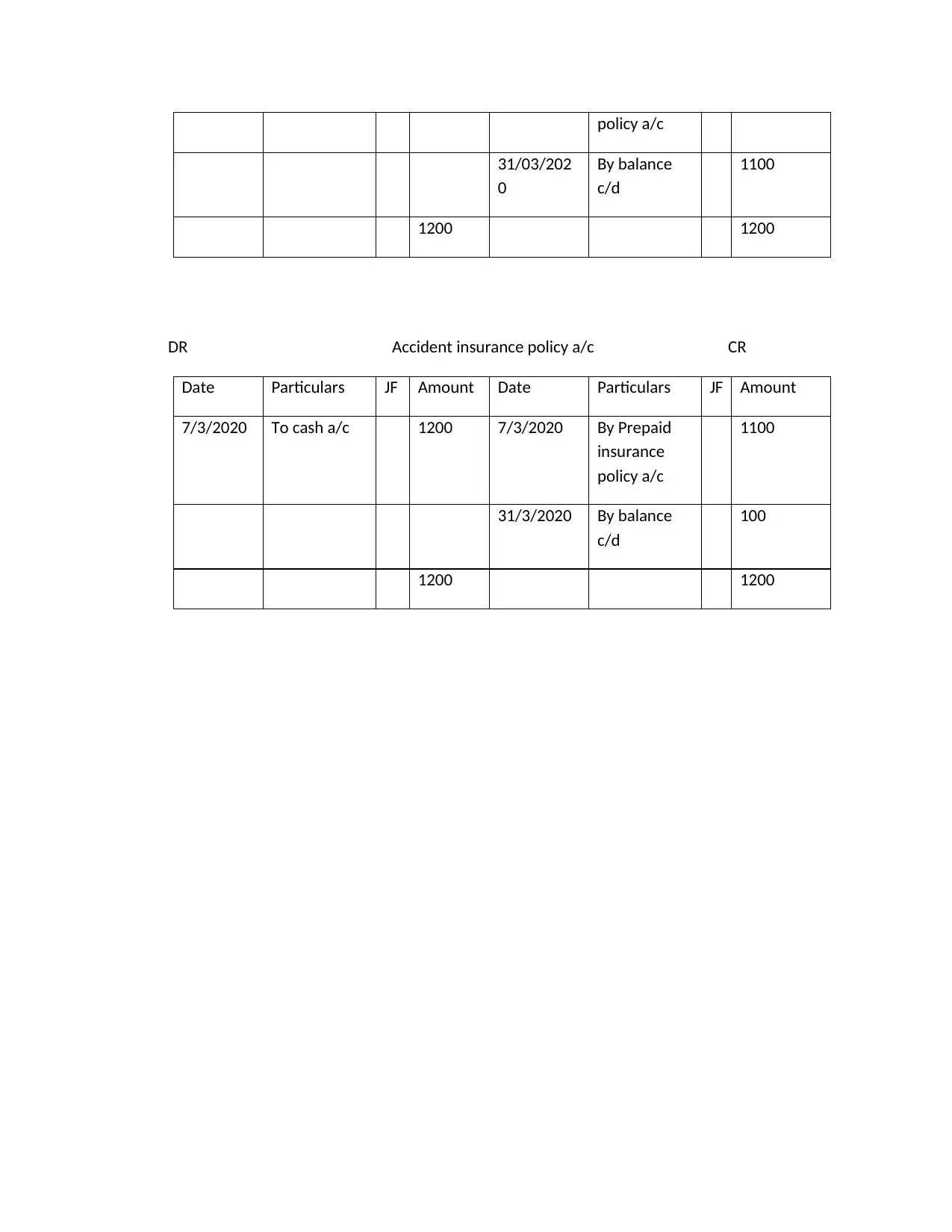
policy a/c
31/03/202
0
By balance
c/d
1100
1200 1200
DR Accident insurance policy a/c CR
Date Particulars JF Amount Date Particulars JF Amount
7/3/2020 To cash a/c 1200 7/3/2020 By Prepaid
insurance
policy a/c
1100
31/3/2020 By balance
c/d
100
1200 1200
31/03/202
0
By balance
c/d
1100
1200 1200
DR Accident insurance policy a/c CR
Date Particulars JF Amount Date Particulars JF Amount
7/3/2020 To cash a/c 1200 7/3/2020 By Prepaid
insurance
policy a/c
1100
31/3/2020 By balance
c/d
100
1200 1200
⊘ This is a preview!⊘
Do you want full access?
Subscribe today to unlock all pages.

Trusted by 1+ million students worldwide
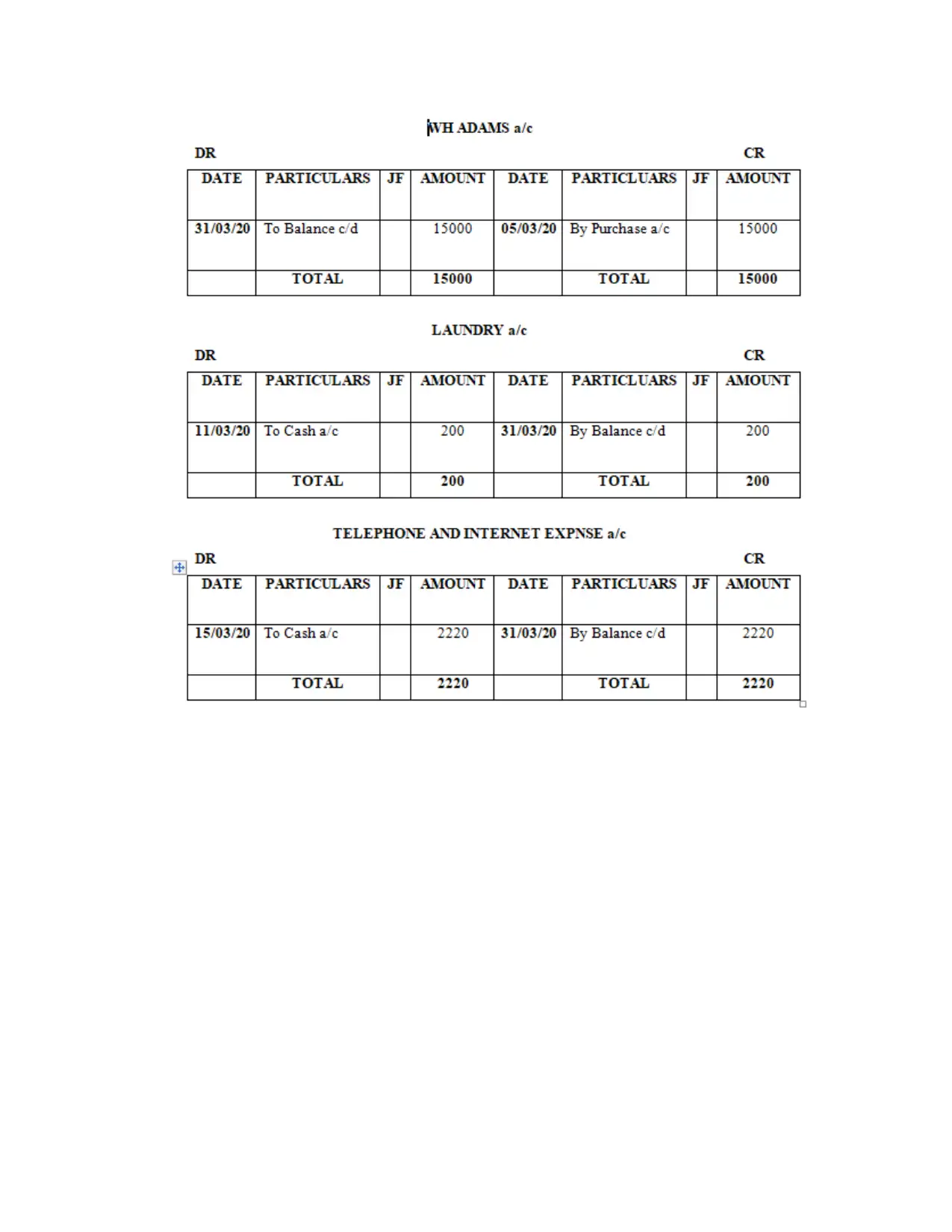
Paraphrase This Document
Need a fresh take? Get an instant paraphrase of this document with our AI Paraphraser
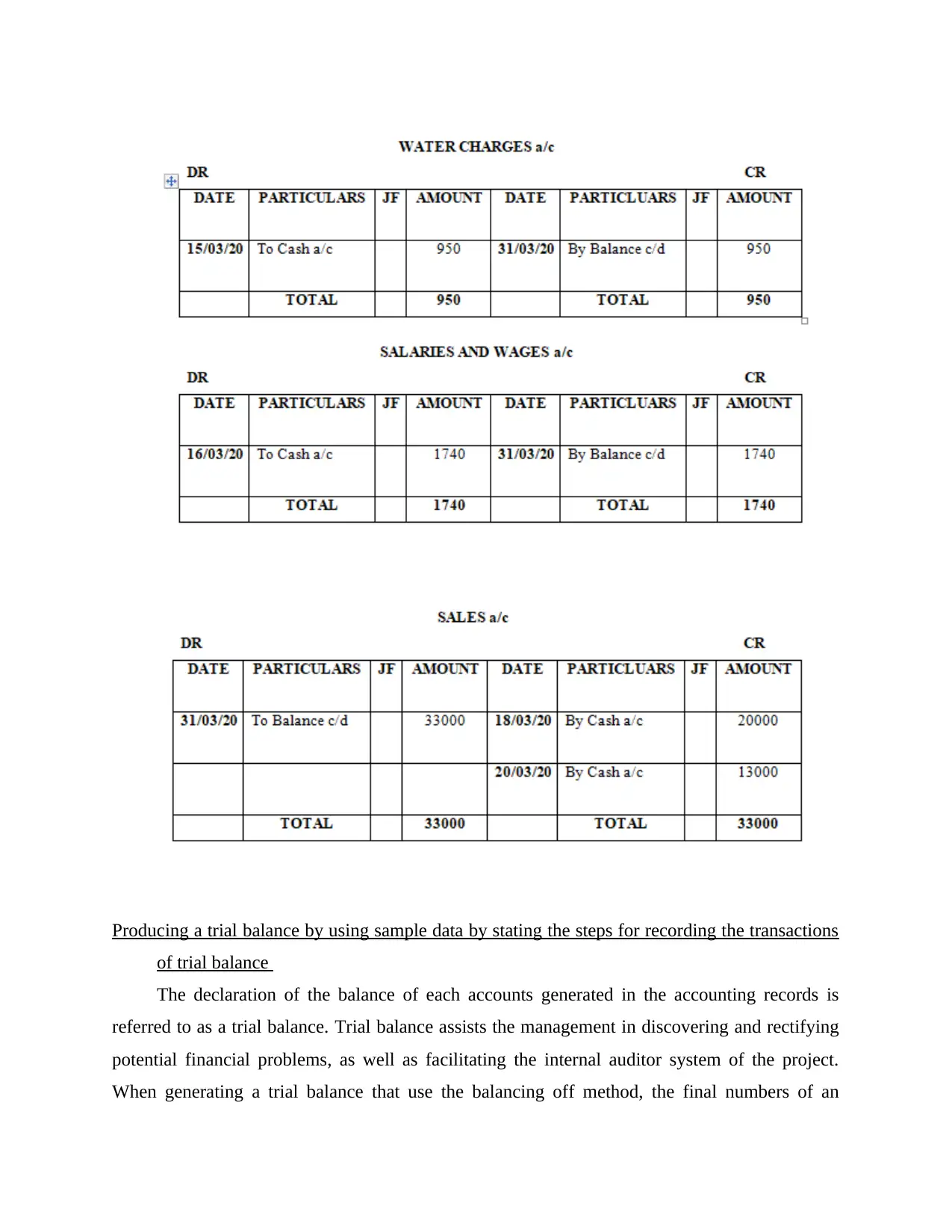
Producing a trial balance by using sample data by stating the steps for recording the transactions
of trial balance
The declaration of the balance of each accounts generated in the accounting records is
referred to as a trial balance. Trial balance assists the management in discovering and rectifying
potential financial problems, as well as facilitating the internal auditor system of the project.
When generating a trial balance that use the balancing off method, the final numbers of an
of trial balance
The declaration of the balance of each accounts generated in the accounting records is
referred to as a trial balance. Trial balance assists the management in discovering and rectifying
potential financial problems, as well as facilitating the internal auditor system of the project.
When generating a trial balance that use the balancing off method, the final numbers of an
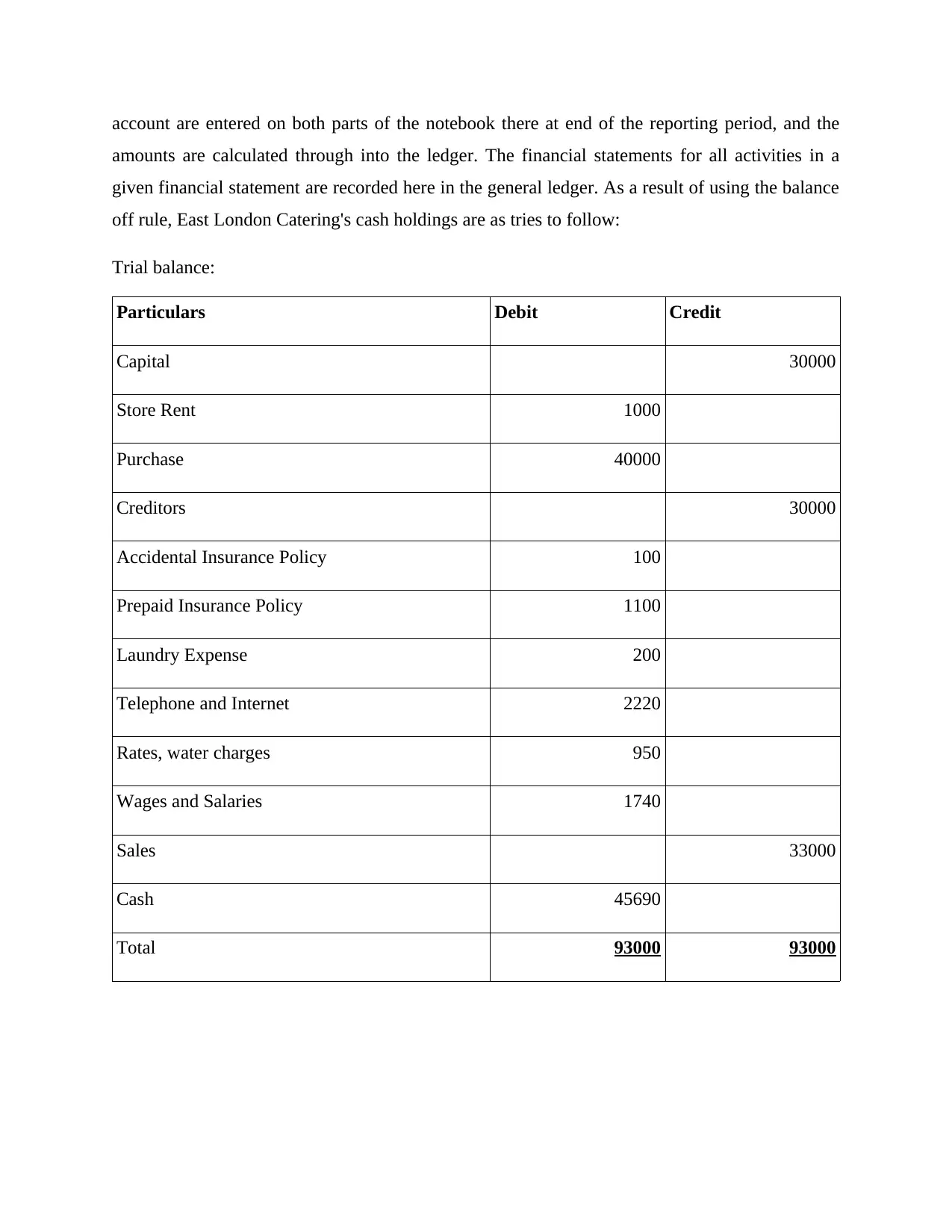
account are entered on both parts of the notebook there at end of the reporting period, and the
amounts are calculated through into the ledger. The financial statements for all activities in a
given financial statement are recorded here in the general ledger. As a result of using the balance
off rule, East London Catering's cash holdings are as tries to follow:
Trial balance:
Particulars Debit Credit
Capital 30000
Store Rent 1000
Purchase 40000
Creditors 30000
Accidental Insurance Policy 100
Prepaid Insurance Policy 1100
Laundry Expense 200
Telephone and Internet 2220
Rates, water charges 950
Wages and Salaries 1740
Sales 33000
Cash 45690
Total 93000 93000
amounts are calculated through into the ledger. The financial statements for all activities in a
given financial statement are recorded here in the general ledger. As a result of using the balance
off rule, East London Catering's cash holdings are as tries to follow:
Trial balance:
Particulars Debit Credit
Capital 30000
Store Rent 1000
Purchase 40000
Creditors 30000
Accidental Insurance Policy 100
Prepaid Insurance Policy 1100
Laundry Expense 200
Telephone and Internet 2220
Rates, water charges 950
Wages and Salaries 1740
Sales 33000
Cash 45690
Total 93000 93000
⊘ This is a preview!⊘
Do you want full access?
Subscribe today to unlock all pages.

Trusted by 1+ million students worldwide
1 out of 20
Related Documents
Your All-in-One AI-Powered Toolkit for Academic Success.
+13062052269
info@desklib.com
Available 24*7 on WhatsApp / Email
![[object Object]](/_next/static/media/star-bottom.7253800d.svg)
Unlock your academic potential
Copyright © 2020–2026 A2Z Services. All Rights Reserved. Developed and managed by ZUCOL.

